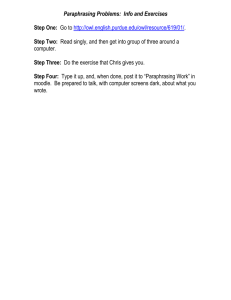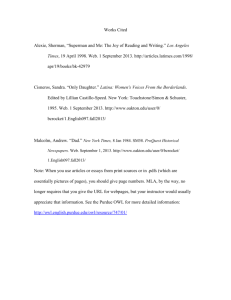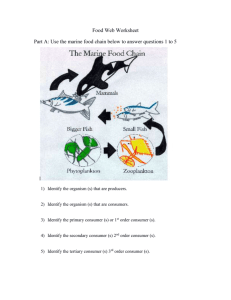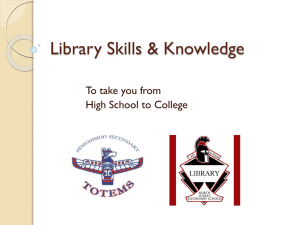2015 English IV Ap Summer Assignment
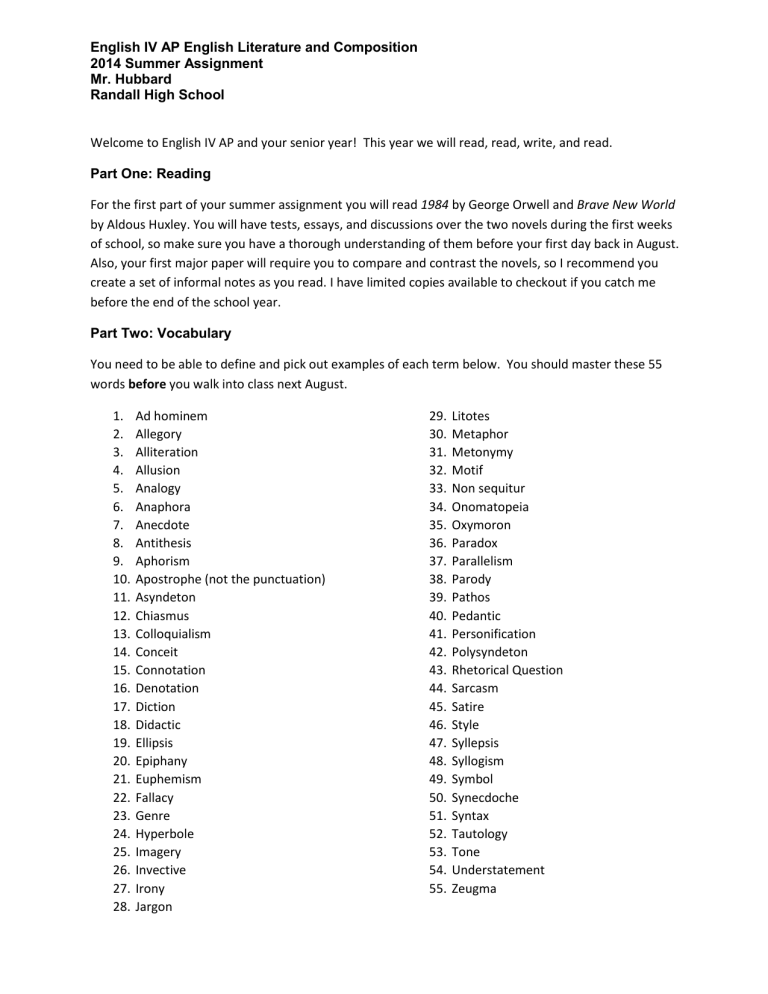
English IV AP English Literature and Composition
2014 Summer Assignment
Mr. Hubbard
Randall High School
Welcome to English IV AP and your senior year! This year we will read, read, write, and read.
Part One: Reading
For the first part of your summer assignment you will read 1984 by George Orwell and Brave New World by Aldous Huxley. You will have tests, essays, and discussions over the two novels during the first weeks of school, so make sure you have a thorough understanding of them before your first day back in August.
Also, your first major paper will require you to compare and contrast the novels, so I recommend you create a set of informal notes as you read. I have limited copies available to checkout if you catch me before the end of the school year.
Part Two: Vocabulary
You need to be able to define and pick out examples of each term below. You should master these 55 words before you walk into class next August.
1.
Ad hominem
2.
Allegory
3.
Alliteration
4.
Allusion
5.
Analogy
6.
Anaphora
7.
Anecdote
8.
Antithesis
9.
Aphorism
10.
Apostrophe (not the punctuation)
11.
Asyndeton
12.
Chiasmus
13.
Colloquialism
14.
Conceit
15.
Connotation
16.
Denotation
17.
Diction
18.
Didactic
19.
Ellipsis
20.
Epiphany
21.
Euphemism
22.
Fallacy
23.
Genre
24.
Hyperbole
25.
Imagery
26.
Invective
27.
Irony
28.
Jargon
29.
Litotes
30.
Metaphor
31.
Metonymy
32.
Motif
33.
Non sequitur
34.
Onomatopeia
35.
Oxymoron
36.
Paradox
37.
Parallelism
38.
Parody
39.
Pathos
40.
Pedantic
41.
Personification
42.
Polysyndeton
43.
Rhetorical Question
44.
Sarcasm
45.
Satire
46.
Style
47.
Syllepsis
48.
Syllogism
49.
Symbol
50.
Synecdoche
51.
Syntax
52.
Tautology
53.
Tone
54.
Understatement
55.
Zeugma
Part Three: Grammar Skills
The following skills should be mastered before you start AP English in August. We will not spend class time going over these items, and you will lose major points if these errors are present in your work.
1.
Correct punctuation of simple, compound (with a comma and semicolon), complex (starting with both dependent and independent clauses), and compound-complex sentences. https://owl.english.purdue.edu/owl/resource/566/02/ https://owl.english.purdue.edu/owl/resource/604/1/
2.
Proper punctuation of a book, movie, short story, poem, magazine, chapter, song, etc… https://web.cn.edu/kwheeler/documents/Punctuating_Titles_chart.pdf
3.
Proper MLA formatting. Most everything you do for me will be typed and MLA formatted. https://owl.english.purdue.edu/owl/resource/747/01/
4.
Comma usage and rules. https://owl.english.purdue.edu/owl/resource/607/02/
5.
Identify and punctuating Independent and dependent clauses. https://owl.english.purdue.edu/owl/resource/598/01/
Part Four: Study Guide
You will need to purchase an AP Literature and Composition study guide before school starts (be sure to get a Literature and Composition guide and NOT a Language and Composition guide). It is up to you what company you get it from; I like the 5 Steps to a 5 series.
Part Five: Book
You will need to purchase a copy of How To Read Literature Like A Professor (revised edition) by Thomas
C. Foster. We will use this book as a textbook and have regular readings and discussions from it throughout the year. You DO NOT need to read this during the summer. You can find the book at
Hastings, Barnes and Nobel, Amazon, etc… It is currently priced at $15.99 (as of May, 2015).
Part Six: Supplies
Dark blue or black pens
Pencils
Highlighters (4+ colors)
Lots of loose-leaf paper
Composition book or spiral
1”+ Binder with 5 dividers
Vinyl folder
AP Literature Study Guide
How To Read Literature Like A Professor
Flash/thumb drive
Sticky notes
Good attitude
Willingness to work and try hard
You can reach me at chubbard@canyonisd.net
if you have any questions. I will respond to student emails semi-regularly. I hope you enjoy the novels, and I look forward to learning with you next year.
Mr. Craig Hubbard
